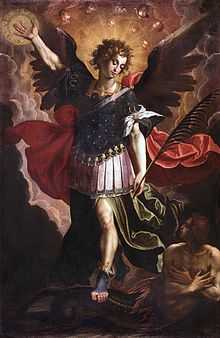Cristóbal Vela

Cristóbal Vela (c. 1588-1654) was a Spanish Baroque painter and gilder.
Born in Jaén, Spain, the art historian Antonio Palomino states that Vela studied in Córdoba, Andalusia, with Pablo de Céspedes, from where he moved to Madrid, and worked in the style of Vincenzo Carducci. He worked in Seville in 1610, and was due to return to Jaén. He was in Jaen in 1618, when he took over the golden altarpiece of San Anton in the church of San Juan, and 1619, in which he was hired for an altarpiece in Campillo de Arenas.
In 1627 he was established in Priego, where he contracted the altarpieces of St. Peter and Our Lady of the Rosary in the parish church, and these are the oldest surviving works of his in Córdoba. There he married Catherine Garrido, and they had a son, Antonio Vela Cobo (1629-1675), who became a painter, sculptor and gilder, and who took over his father's workshop after his death. In 1635, Vela is located in Cordoba, with plenty of documented work, both painting and gilding of altarpieces and sculptures. In 1645 he was awarded altarpiece paintings of the cathedral, in competition with Antonio del Castillo y Saavedra.
But it is in the wall paintings of the church of St. Augustine in Cordoba where Vela's best work with his paintings of archangels, now located in the Museum of Fine Arts, Córdoba and church of Santa Marina, or the different versions that made the theme of the Immaculate in the altarpiece of Our Lady of the Rosary in Priego de Córdoba, parish of San Pedro and sotacoro of the same church of San Agustín de Córdoba, which follows the iconographic indications Francisco Pacheco.
References
- Lopez Molina, Manuel, "Painters Giennenses of the first half of the seventeenth century ', Bulletin of the Institute of Giennenses, t. II, No. 172 (1999), p. 921-946.
- Palomino, Antonio (1988). The pictorial museum optical scale III. The picturesque Spanish Parnassus laureate .. Madrid: Aguilar SA Editions. ISBN 84-03-88005-7.
- Pérez Sánchez, Alfonso E. (1992). Baroque Painting in Spain 1600-1750. Madrid: Ediciones Chair. ISBN 84-376-0994-1.
- Raya Raya, Maria Angeles (1986). Cordoba and religious painting (XIV-XVIII). Cordoba: Pawnshop Publications and Savings Bank of Córdoba. ISBN 84-7580-225-0.
| Wikimedia Commons has media related to Cristóbal Vela. |